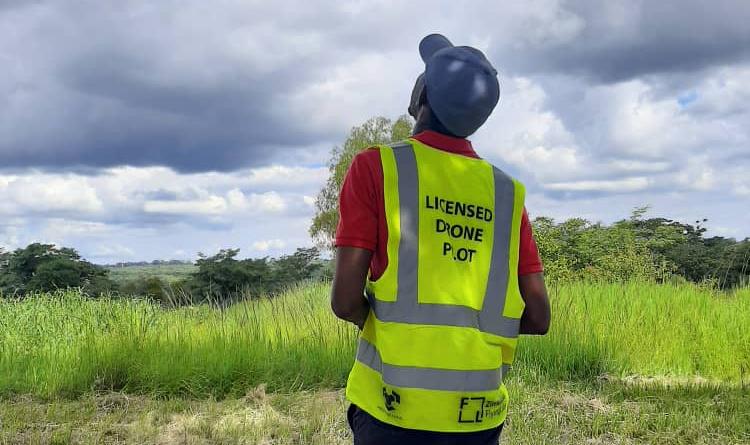Day 1 of the 2022 Zimbabwe International Drone Conference was a banger. The event kicked off with an address by Tawanda Chihambakwe of Precision Aerial Group, the organisers of the conference.
After his opening remarks we went straight to the keynote speaker – the Director General of the Civil Aviation Authority of Zimbabwe, Dr Engineer Elijah Chingosho.
His was an interesting and encouraging presentation. After going through the importance of drones he went into the need for regulations.
He said the Civil Aviation of Zimbabwe (CAAZ) is “taking deliberate steps and effort as the Aviation regulator to create an enabling environment to promote the growth of the local drone industry.”
He expanded on that and talked about the balancing act the regulator has to perform. On one hand they have to ensure society’s safety, privacy and security are not compromised.
On the other, they have to make sure not to stifle the young drone industry which still needs to ‘evolve, innovate and mature.’
Regulations not in stone
But wait. That’s exactly what you would expect him to say even if that wasn’t the case, isn’t it? Being the regulator, we are inclined to not believe anything he says. That’s the RBZ effect. The Reserve Bank of Zimbabwe ruined it all for every other regulator.
However, when the Dr Engineer went into how Statutory Instrument 271 of 2018 that regulates remotely piloted aircraft in Zimbabwe is just the first issue and so is subject to amendments I felt a surge of hope.
That’s not to say the SI is terrible as it stands. It can be improved, obviously, but those regulated by the SI that were present appear to be somewhat happy with it and with the regulator, CAAZ.
Listen, I know, they couldn’t exactly come out and say CAAZ was a mess when the regulator was sitting right there, in the front row. That would have been an unwise thing to do. That may be but I believed them when they said working with CAAZ was rather pleasant.
I guess it’s one of those where you had to be there. And you still can be there, click here to find out how. If you were there you would have believed it too.
CAAZ licences many drone pilots
The Dr Engineer said CAAZ saw a number of companies apply for Remotely Piloted Aircraft Operator Certificates (ROC) over the past year.
If a company is to use drones commercially they need this ROC which allows for operation above 120m, within a radius of 5km from an aerodrome or to release, dispense, drop, deliver or deploy substances etc.
CAAZ says a number also applied for Remotely Piloted Aircraft Training Organisations Certificates (RTO). With the RTO these companies are authorised to train pilots.
CAAZ then issued a substantial number of Remote Pilot Licences (RPL) after candidates underwent theoretical and practical training with the approved Remotely Piloted Aircraft Training Organisations (RTOs).
Alex Chiduwa, a Flight Operations Inspector at CAAZ dove deeper into the regulatory framework for remotely piloted aircraft in Zimbabwe.
After a solid round of Q&A, CAAZ gave up the stage.
What do you think?
Do you have any particular areas you think CAAZ should focus on? Where do you think the current Statutory Instrument needs to be amended?
Some are of the mind that we should not be regulating drones using weight but rather attachments. The rational being that being lax on drones that weigh less than 2kg is a mistake because a tiny drone with a signal jammer is more dangerous than a 10kg dumb drone.
Even a visitor from Kenya highlighted that they don’t give small drones a pass over there. A little 250g drone is regulated just like the 20kg one.
Let us know in the comments what you think about all this.
Also read:
The 2nd edition of the drone conference in Zimbabwe is upon us
Local drone tech hub launches – Here’s what you need to know about Zim Flying Labs

3 comments
African governments regulate based on fear, someone is afraid a tiny drone can be used to assassinate them, as if a would be attacker would register the drone to begin with or buy it from a traceable source.
You regulate to govern expected usage and expected misusage. A signal jammer is not an expected misusage. You could attach a signal jammer to a bicycle, should we then require a certified bicycle operators licence? The use of signal jammers is regulated by other acts, and that’s where that misusage will be enforced. Otherwise, our laws become too complex trying to cover every possible scenario.
Presently, motor vehicles kill more people per day than drones have per year. But, drones are being treated like they are more dangerous than motor vehicles.
The biggest threat drones pose is to privacy, when equipped with a camera. So, I would understand why those would require registration, but not why you need a renewable licence to operate one.
Out of curiosity, who trained those offering training services? If the trainers are self taught, surely self taught pilots should be able to certify without passing through a training school.
“Otherwise, our laws become too complex trying to cover every possible scenario.” That is were the problem is vakoma @ Imi Vanhu Musadaro. Zvinototidzora progress on a lot of things just because a lot of their judging and making their decisions based on fear.
This a whole lot of BS, so does it also mean children with toy helicopters need to be licensed? I will continue flying my drone without a license.Madhiri ekungobiirana Mari aya hapana zvimbo ripi apa.